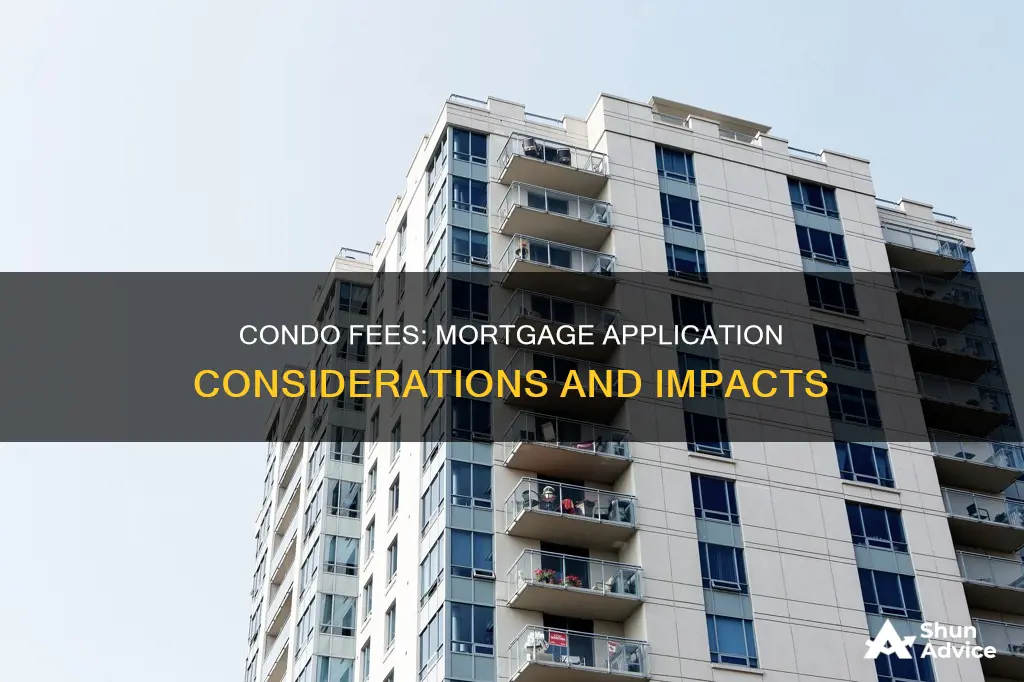
Condo fees, also known as HOA (Homeowners Association) fees, are monthly charges paid by condo owners to cover shared building expenses, maintenance, utilities, and common area upkeep. These fees are paid in addition to mortgage payments and other expenses. When applying for a mortgage, condo fees impact affordability assessments and mortgage approvals. Lenders will consider not only your finances but also those of the condominium community. This means that condo fees can affect your ability to secure a mortgage and the amount you are approved for.
How do condo fees apply when applying for a mortgage?
| Characteristics | Values |
|---|---|
| Condo fee definition | A monthly charge paid by condo owners to cover shared building expenses, maintenance, utilities, and common area upkeep |
| Condo fee payment | Paid directly to the homeowners' association (HOA) and are separate from mortgage payments |
| Condo fee purpose | Covers expenses related to shared spaces and services, including amenities, common areas, maintenance, and repairs |
| Condo fee variation | The specifics of what's covered can vary between different condominium properties, depending on the association budget, repairs/maintenance needs, and specific condo rules |
| Warrantable vs. non-warrantable condo | A warrantable condo follows rules set by Fannie Mae and Freddie Mac, making it eligible for a conventional loan; a non-warrantable condo doesn't follow these rules, making financing more difficult |
| Additional costs | Condo insurance, association dues, property taxes, mortgage insurance, development charges, GST/HST, warranty program enrollment, utility hookup, landscaping, common expenses, and occupancy fees |
| Affordability | Lenders may use the GDS (Gross Debt Service) ratio formula to assess affordability, aiming to keep the ratio below 39% based on income |
| Mortgage process | Similar to buying a house, including choosing a mortgage term, weighing fixed vs. variable rates, and setting payment frequency; however, additional considerations apply for condos, and it can be harder to qualify due to extra fees |
What You'll Learn

Condo fees are separate from mortgage payments
Condo fees, also known as HOA (Homeowners Association) fees, are separate from mortgage payments. While your mortgage covers your individual unit, condo fees are paid for expenses related to the shared spaces and services within a condominium complex. These fees are typically based on the size of the condo unit, the amenities the building offers, and any anticipated annual expenses.
Condo fees are paid in addition to mortgage payments and other expenses, such as utilities, landscaping, general maintenance, and amenities like gyms, swimming pools, and parking lots. They are usually paid monthly and are mandated by the HOA, which decides on the rules and enforces them for the members living in the community. The association also meets regularly to prioritize work projects and submit and consider bids for work to be done for the entire complex.
The fees can vary between different condominium properties, depending on the specific condo, the repairs/maintenance required, and the association's budget. However, there are some general things that condo fees typically cover, such as amenities and common areas, maintenance, and repairs. It's important to note that condo fees do not usually include property taxes, which are typically paid separately by each unit owner.
When applying for a condo mortgage, it is considered just like applying for financing to buy any other home, but with a few additional considerations. Condo fees can impact mortgage approvals, as they are deducted from your usable income. The bigger the condo fee, the bigger the impact on mortgage approvals. Therefore, it is crucial to evaluate all the costs associated with owning a condo, including condo fees, when considering a condo purchase.
Canadians' Guide to Getting a Mortgage: Step-by-Step
You may want to see also

Condo fees are paid to the homeowners' association (HOA)
Condo fees, also known as maintenance fees, are paid to the homeowners association (HOA). They are separate from mortgage payments and are paid in addition to them. These fees are typically paid monthly and are used to cover the costs of maintaining and repairing common areas and amenities such as gyms, pools, gardens, hallways, elevators, and lobbies. They may also cover building cleaning, landscaping, and concierge staff. The amount of the condo fee depends on factors such as the size of the condo unit, the age of the building, and the amenities offered.
The HOA is an organization that creates and enforces rules for the members living in the condominium community. They also prioritize work projects and submit and consider bids for maintenance and repairs. When an individual purchases a condominium, they become a member of the HOA and are required to pay the condo fee, which is used to fund these projects and upkeep.
It is important to note that condo fees are not included in the mortgage payments and must be paid separately. They are a mandatory ongoing cost for as long as one owns the condo unit, even if the mortgage is fully paid off. The fees can vary between different condominium properties, and it is essential to understand the specific condo association's rules and financial situation before purchasing a unit.
The HOA dues can range from a few hundred to over a thousand dollars per month, and they are an essential factor to consider when deciding if one can afford the total costs of owning a condominium. These fees can also increase over time, so it is advisable to look for condos with a high reserve fund to avoid exponential increases in maintenance fees each year.
USDA Mortgage Applications: Current Requirements and Updates
You may want to see also

Condo fees are mandatory for as long as you own the unit
Condo fees, also known as maintenance fees, are mandatory for as long as you own the unit. They are separate from your mortgage payments and are paid directly to the homeowners' association (HOA). These fees are typically paid monthly and are used to cover the upkeep of shared spaces and amenities such as gyms, pools, and gardens, as well as common areas like hallways, elevators, and lobbies.
The amount of condo fees can vary depending on several factors, including the size of the condo unit, the age of the building, the amenities offered, and any anticipated annual expenses. These fees can range from a few hundred to over a thousand dollars per month. It's important to factor in these fees when deciding if you can afford the mortgage for a condo purchase.
While your mortgage covers your individual unit, condo fees are essential for maintaining the shared spaces and services within the condominium complex. These fees are decided upon by the condominium or homeowners association (HOA), which is an organization that enforces rules and prioritizes work projects for the community.
In addition to the monthly condo fees, it's worth noting that some well-managed condo associations maintain reserve funds funded by these fees. These reserve funds are used to handle unexpected maintenance projects, ensuring that each condo owner sets aside money for repairs on a regular basis. This can be beneficial for condo owners as it helps to avoid sudden increases in fees due to unexpected expenses.
Overall, condo fees are an essential consideration when purchasing a condo and will be a mandatory expense for as long as you own the unit, even after your mortgage is fully paid off.
Ford's Risky Move: Betting All Assets to Stay Afloat
You may want to see also

Condo fees cover building maintenance and repairs
Condo fees, also known as condominium or homeowners association (HOA) fees, are periodic fees paid by condo owners to cover shared building expenses. These fees are typically paid monthly and are in addition to mortgage payments, property taxes, and insurance. They are calculated based on the size of the condo unit, the amenities offered by the building, and any anticipated annual expenses.
Condo fees cover the cost of building maintenance and repairs, including landscaping, groundskeeping, snow removal, trash collection, exterior wall repair and maintenance, and roof repair and maintenance. The fees also contribute to the upkeep and repair of amenities such as swimming pools, gyms, clubhouses, and parking areas. Some associations may also include basic utilities and services in the condo fees, such as water, heating, electricity for shared spaces, and trash pickup.
In addition to covering maintenance and repairs, condo fees also contribute to building insurance, which is necessary for protection against sudden losses arising from natural disasters or other unforeseen events. The fees may also be used to build a reserve fund for future large repairs or unexpected maintenance projects. This ensures that the condo building can maintain its functionality and appearance over time.
It is important to note that the maintenance responsibilities between the condo owner and the COA (condo association) may vary depending on the community's rules and governing documents. While the COA typically handles the structural areas of the building, such as foundations, individual unit owners may be responsible for maintenance and repairs within their units, including interior walls, floors, ceilings, and fixtures.
Overall, condo fees provide a convenient way to cover the costs of building maintenance and repairs, contributing to the upkeep of shared spaces and amenities while also ensuring protection through building insurance and reserve funds.
Mortgages: The Importance of Recent Financial Information
You may want to see also

Condo fees are considered in mortgage affordability calculations
Condo fees are a crucial factor in determining mortgage affordability. These fees, paid by condo owners, cover shared building expenses, maintenance, utilities, and common area upkeep. They are typically based on the size of the condo unit, the amenities offered, and anticipated annual expenses. When applying for a mortgage, lenders will consider not only your finances but also the finances of the condominium community.
The condo fee is a monthly charge that condo owners must pay in addition to their mortgage payments. It is used to maintain and manage the shared spaces and amenities within the condominium complex. The fee is determined by the condominium association or homeowners association (HOA), which is responsible for enforcing the rules and maintaining the property.
When assessing mortgage affordability, condo fees are considered as part of the borrower's total monthly expenses. The larger the condo fee, the greater the impact on mortgage approvals. This is because the income available for mortgage payments is reduced by the amount of the condo fee. In some cases, banks may only deduct half of the monthly condo fee from the borrower's usable income, recognizing that condo fees can reduce certain expenses associated with freehold homes, such as maintenance costs.
It is important for individuals to consider all the costs associated with owning a condo, including not only the principal and interest portion of the mortgage payments but also condo fees, insurance, association dues, property taxes, and mortgage insurance (if applicable). Comparing the total costs of owning a condo to those of buying a single-family home can help individuals make an informed decision about their purchasing power and whether a condo is the right choice for them.
The Inception of Morty Mortgage: A Historical Perspective
You may want to see also
Frequently asked questions
Condo fees are monthly charges paid by condo owners to cover shared building expenses, maintenance, utilities, and common area upkeep. These fees are paid to the condo corporation and are separate from mortgage payments.
Condo fees are not included in your monthly mortgage payments but they can affect your mortgage application. The fees are an additional cost that needs to be factored into your budget and can impact your ability to satisfy debt service ratio requirements.
The amount of condo fees varies depending on factors such as the size of the condo unit, the age of the building, and the amenities offered. Fees can range from a few hundred dollars to over a thousand dollars per month.







